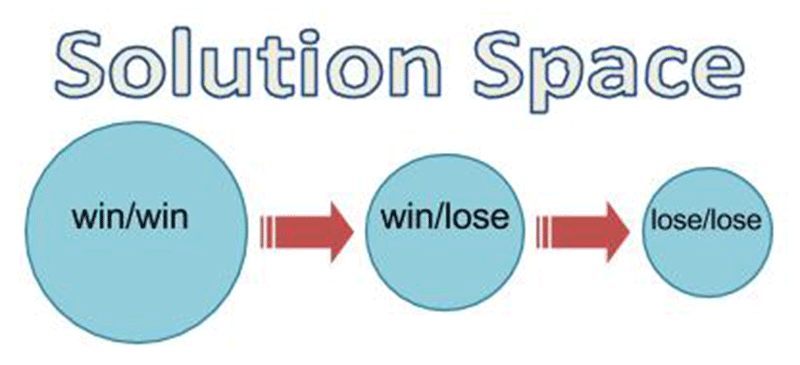In an interview on June 30 on NPR’s KHSU* about my forthcoming book, Talk Matters! (stay tuned), a dear colleague phoned in with a delicious question: “If you could wave a magic wand, how would you change how we approach public hearings?” My answer included ideas and examples of how to make such gatherings engaging and participatory. Here I add an afterthought: the importance of opening up the solution space by creating win/win interactions.
When you convene and/or participate in meetings, are you in it to “win” for yourself or a particular point of view? Or, are you in it to find the best possible outcome for the group and your organization or community as a whole?
When we become intent on winning, pushing our agenda, beating the opposition, or silencing or intimidating those with whom we disagree, we all lose. We lose because a solution or decision that comes out of a win/lose (or lose/lose) process doesn’t get us to where we want to go.
There are several reasons for this. The results of win/lose or lose/lose interactions are usually piecemeal solutions or compromises that
- don’t touch the real issue;
- don’t have the benefit of everyone’s best thinking;
- will be implemented slowly, begrudgingly, or not at all;
- can easily become the target of litigation by those who “lost”; and
- deepen the divides among people.
Labor/management negotiations are classic examples of win/lose interactions that often fall back to lose/lose results: strikes or lockouts. Voting by elected or appointed governmental bodies (City Councils, Boards of Supervisors, School Boards) are also win/lose. Making decisions by voting rarely occurs in organizations because managers usually have the final word (ideally after they have gathered input from their direct reports). However, too often, employees perceive such decisions in terms of who wins and who loses.
The bottom line is that if you start with the mindset that someone has to win and someone has to lose you often end up with decisions where everyone loses: ineffectual compromises, stalemates, lost opportunities, and hard feelings. By starting with the intention of working towards win/win results, you increase the likelihood you can reach conclusions that respond to everyone’s interests. In other words, you open up the “solution space” for more possibilities, more ways to solve issues that benefit your organization or community as a whole. You can always fall back to the narrower solution space of win/lose if necessary.
Please note, however, once you interact in the win/lose space, it is really tough to move back to win/win. By then most people are dug into their positions and are hijacked by fear and/or anger.
When we focus on winning or getting our way in meetings we lose the opportunity to learn, solve problems, and create a sense of community that can help all of us win in the long run.
*Thank you to interviewer extraordinaire Danielle Orr!

